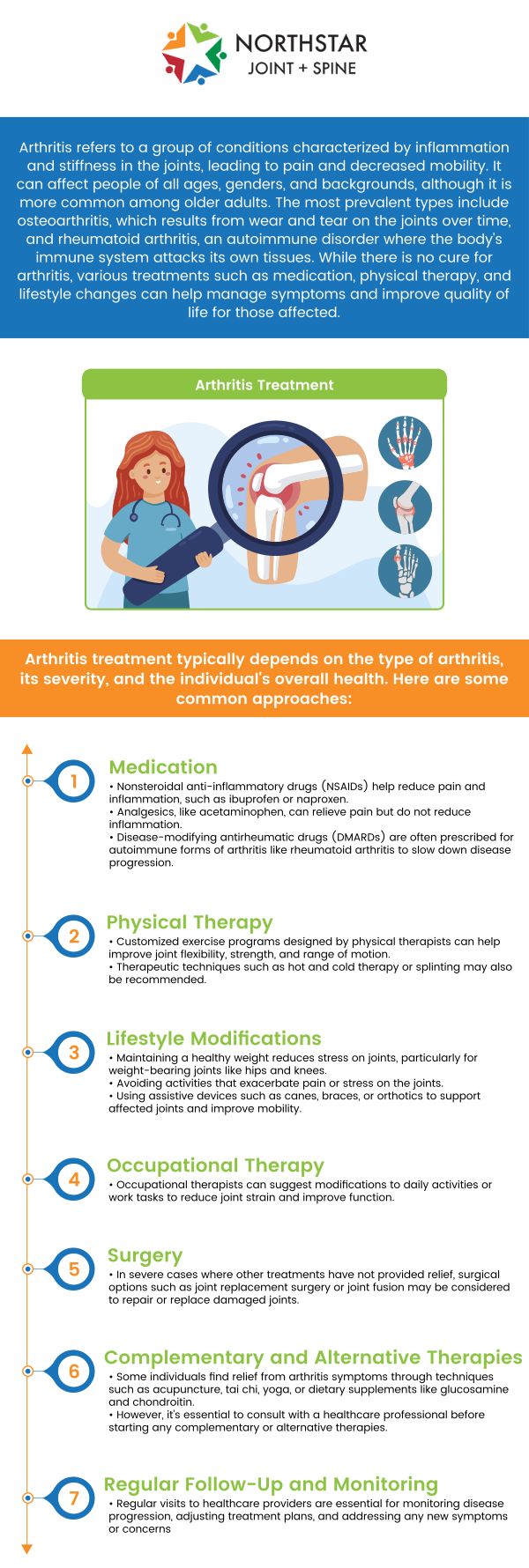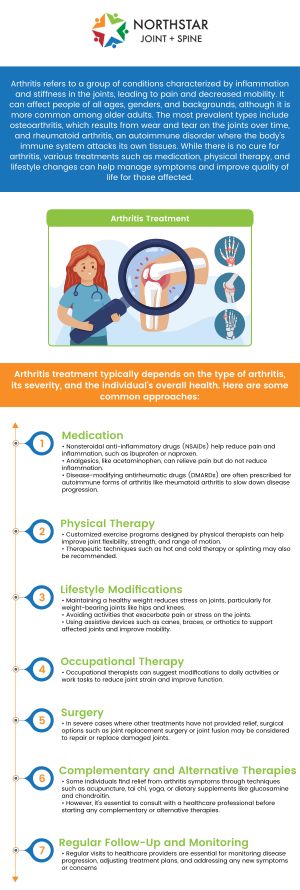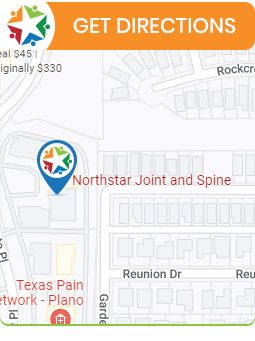Rheumatoid Arthritis Treatment Specialist in Plano, TX
Rheumatoid arthritis is a chronic autoimmune disorder that primarily affects the joints, causing inflammation, pain, and stiffness. Common symptoms include joint swelling, tenderness, and reduced mobility. The exact cause is unknown, but it involves the immune system mistakenly attacking the body’s tissues. At Northstar Joint and Spine, Board Certified Dr. Robert J. Nocerini, MD, provides specialized care for managing rheumatoid arthritis and improving quality of life. For more information, contact us today or book an appointment online. We are conveniently located at 7704 San Jacinto Pl Suite #200 Plano, TX 75024.




Table of Contents:
What is rheumatoid arthritis?
What are the symptoms of rheumatoid arthritis?
What causes rheumatoid arthritis?
How does rheumatoid arthritis affect the joints?
Targeted Rheumatoid Arthritis Treatment Solutions by Dr. Robert Nocerini at Northstar Joint and Spine in Plano, TX
Rheumatoid arthritis is a long-term autoimmune disorder where the body’s immune system begins attacking its joint tissue. Rather than responding to external threats, the immune response mistakenly targets the synovium, which is the thin membrane surrounding joints. This sets off a chain of inflammation that doesn’t stop when it should. Over time, that inflammation thickens the synovium and can wear down cartilage, bone, and surrounding structures. What begins as swelling and soreness in the joints can gradually result in joint instability, permanent damage, and changes in function.
This condition often progresses slowly, but in certain individuals, the onset may seem more rapid. It tends to start in smaller joints such as the fingers, wrists, or toes, then spread to larger joints as it advances. Because the root of the disease is systemic rather than mechanical, it can affect both sides of the body in a symmetrical pattern, which is one of the ways it differs from other joint conditions. Many patients may experience fatigue, low-grade fever, or involvement of other tissues like the eyes or lungs. Without early diagnosis and ongoing care, the long-term effects can become more severe, making consistent management an essential part of living with the disease.
The symptoms of rheumatoid arthritis tend to build gradually, starting with mild discomfort in the joints and progressing into persistent pain, swelling, and stiffness. One of the more distinct features is morning stiffness that may last an hour or longer. That lingering stiffness after waking or sitting still is a key sign that inflammation is active within the joints. The affected joints may appear swollen or warm to the touch, and the discomfort often shows up in pairs, affecting both wrists or both knees at the same time. Rheumatoid arthritis is known for triggering a range of systemic symptoms. Chronic fatigue is common, even during periods when joint pain is more manageable. Some individuals may notice weight loss, low energy, or even slight fevers. The disease also moves through periods of flare-ups followed by stretches where symptoms ease, known as remission. These cycles make it difficult to predict how it will behave day to day. Understanding the timing, triggers, and frequency of symptoms helps guide long-term treatment decisions, which are focused not only on reducing inflammation but also preserving joint structure and daily function.
Rheumatoid arthritis develops when the immune system turns against the body’s own tissue, particularly the joints. While the exact cause of that misfire isn’t fully understood, it’s generally believed that a combination of genetic predisposition and environmental exposure contributes to the immune system’s malfunction. In many cases, individuals who develop the condition carry certain genes that increase susceptibility, but not everyone with these genetic markers ends up with the disease. That suggests additional triggers, such as stress, hormonal shifts, or infections, may play a role in setting the process in motion. Once the immune system begins reacting in this way, it treats healthy tissue as though it were harmful. That faulty response leads to the inflammation that defines the condition. Over time, if left unchecked, this can cause erosion of the joints, damage to nearby ligaments and tendons, and even involvement of other systems in the body. While lifestyle habits don’t directly cause rheumatoid arthritis, they can influence how manageable the symptoms are over time. Early medical support, especially when combined with regular monitoring and targeted care, is key to slowing the disease and protecting long-term joint health.
Rheumatoid arthritis impacts the joints by creating ongoing inflammation in the synovial lining, which is the protective tissue around each joint. That inflammation causes the lining to thicken and produce excess fluid, leading to joint swelling and tenderness. As the disease progresses, it starts breaking down cartilage. This results in narrowing of the joint space and increased friction with movement. As the damage continues, bone erosion and joint deformity can begin to develop, especially if treatment is delayed or symptoms are left unmanaged. Individuals might notice that basic motions like gripping, standing, or walking become more difficult. Joints can become visibly misshapen or develop reduced range of motion, especially in areas like the hands, knees, or feet. That kind of joint damage can directly interfere with function, making it harder to complete everyday tasks. Over time, if inflammation remains active, the risk for joint instability and irreversible damage increases. The specialists at Northstar Joint and Spine focus on identifying these changes early and using targeted treatment plans that help limit further joint erosion and support mobility.
Board-Certified Dr. Robert Nocerini, MD at Northstar Joint and Spine in Plano, TX, specializes in managing rheumatoid arthritis through a comprehensive, patient-first approach. His treatments are designed to relieve chronic joint pain, reduce inflammation, and improve functional movement using minimally invasive, precision-guided techniques. By addressing the underlying pain pathways, Dr. Nocerini helps patients restore comfort and maintain joint flexibility.
With over two decades of experience, Dr. Nocerini’s care goes beyond symptom relief—he focuses on supporting long-term wellness and improved mobility. Patients benefit from advanced interventional options and compassionate follow-up designed to maximize recovery. Through his hands-on approach and detailed evaluation process, Dr. Nocerini continues to help patients live fuller, more active lives free from persistent rheumatoid pain.
For more information, contact us today or book an appointment online. We are conveniently located at 7704 San Jacinto Pl Suite #200 Plano, TX 75024. We serve patients from Plano TX, Willow Bend TX, Frisco TX, Allen TX, Addison TX, North Dallas TX, and surrounding areas.

Check Out Our 5 Star Reviews


Additional Services You May Need
▸ Back Pain
▸ Shoulder Pain
▸ Chronic Pain
▸ Epidural Steroid Injections
▸ Spinal Cord Stimulation
▸ Viscosupplementation
▸ Genicular Nerve Blocks
▸ Facet Injections
▸ Joint Injections
▸ Sacroiliac Joint Injections
▸ Lumbar and Cervical
▸ Facet Medial Branch Blocks
▸ Diagnostic Nerve Blocks
▸ Medication Management
▸ Neck Pain Doctor
▸ Diabetic Peripheral Neuropathy
▸ Headaches
▸ Suboxone
▸ Peripheral Nerve Stimulation
▸ Spine
▸ Joints
▸ Muscles
▸ Bones

Additional Services You May Need
▸ Back Pain
▸ Shoulder Pain
▸ Chronic Pain
▸ Epidural Steroid Injections
▸ Spinal Cord Stimulation
▸ Viscosupplementation
▸ Genicular Nerve Blocks
▸ Facet Injections
▸ Joint Injections
▸ Sacroiliac Joint Injections
▸ Lumbar and Cervical
▸ Facet Medial Branch Blocks
▸ Diagnostic Nerve Blocks
▸ Medication Management
▸ Neck Pain Doctor
▸ Diabetic Peripheral Neuropathy
▸ Headaches
▸ Suboxone
▸ Peripheral Nerve Stimulation
▸ Spine
▸ Joints
▸ Muscles
▸ Bones






